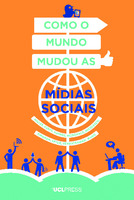Como o Mundo Mudou as Mídias Sociais
Contributor(s)
Miller, Daniel (editor)
Costa, Elisabetta (editor)
Haynes, Nell (editor)
McDonald, Tom (editor)
Nicolescu, Razvan (editor)
Sinanan, Jolynna (editor)
Spyer, Juliano (editor)
Venkatraman, Shiram (editor)
Wang, Xinyuan (editor)
Language
PortugueseAbstract
How the World Has Changed Social Media is the first book by Why We Post, a book series that investigates the findings of nine anthropologists who have spent 15 months living in communities in different parts of the world, including Brazil, Chile, China, England, India, Italy, Trinidad and Turkey. This book offers a comparative analysis that summarizes research findings and analysis of the impact of social media on politics and gender, education, and commerce. What is the result of the increased emphasis on visual communication? Are we becoming more individualistic or more social? Why is public social media so conservative? Why can't equality on the internet nullify inequality? How did memes become the moral police of the internet? Como o Mundo Mudou as Mídias Sociais é o primeiro livro da Why We Post, uma série de livros que investiga as descobertas de nove antropólogos, que passaram 15 meses vivendo em comunidades em diferentes partes do mundo, incluindo Brasil, Chile, China, Inglaterra, Índia, Itália, Trinidad e Turquia. Este livro oferece uma análise comparativa que resume os resultados da pesquisa e a análise do impacto das mídias sociais sobre política e gênero, educação e comércio. Qual é o resultado do aumento da ênfase na comunicação visual? Estamos nos tornando mais individualistas ou mais sociais? Por que as mídias sociais públicas são tão conservadoras? Por que a igualdade na internet não consegue anular a desigualdade? Como os memes se tornaram a polícia moral da internet?
Keywords
anthropology; media studies; sociology; area studiesDOI
10.14324/111.9781787356542ISBN
9781787356542OCN
1113868195Publisher
UCL PressPublisher website
https://www.uclpress.co.uk/Publication date and place
London, 2019Series
Why We Post,Classification
Communication studies
Media studies
Sociology and anthropology


 Download
Download Web Shop
Web Shop